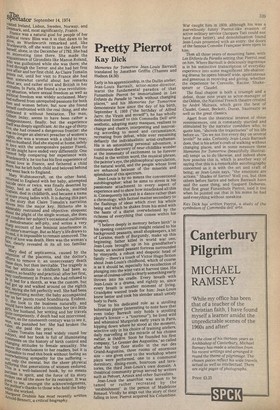• Pretty Pierrot
Kay Dick
Memories for Tomorrow Jean-Louis Barrault translated by Jonathan Griffin (Thames and Hudson £4.50) Early in his apprenticeship, in the Dullin atelier, Jean-Louis Barrault, actor-mime-director, learnt the fundamental paradox of that Funambule Pierrot he immortalised in Les Enfants du Parudis to "walk without changing places," and his Memories for Tomorrow demonstrate how since the day of his birth, September 8, 1910 ("the birthday of Alfred Jarry. the Virgin and myself"), he has wholly dedicated himself to this Commedia Dell' arte aesthetic, adopting many masques, resilient to change and chance, interpreting and innovating according to mood and circumstance, recreating from defeat, while ever remaining defiantly the individualistic artist-craftsman. His is an astonishing personal• adventure, a continuous discovery of near-childlike wonder at the immensity of excitement to be forever found in the written word, the musical phrase, the painter's eye, the philosophical speculation, the natural world, and the people whose lives are enhanced because of the miseries and splendours of this spectrum. Jean-Louis is by no means the conventional autobiographer; what he aims to stress is his passionate attachment to every aspect of experience and to show how interlinked all this is. Consequently his text is a dance rather than a chronology, with factual matter secondary to the flashings of ideas which rivet his whole being and which he shakes from his mind with the haste of a diarist overwhelmed by the richness of everything that comes within his prospect. "I believe deeply in memory before birth" is his opening controversial insight related to his background: peasants, small shopkeepers, a bit of Loraine, much of Burgundy, make up this beginning; father killed in world war one, Jean-Louis brought up in his grandfather's house, an ancient peasant fortress surrounded by vineyards, a robust and despotic head of family — there's a touch of Victor Hugo fiction about Jean-Louis's childhood, which of course is as it should be, especially his recollection of plunging into the wine vats at harvest time. His sense of cinema-virite is clearly something early thrown into his cradle. Every breath with Jean-Louis is a drama, and rightly so, since every breath is another moment of living. Grandpere wanted trade for him: Jean-Louis knew better and took his slender small untidy body to Paris. True to his dedicated role as a strolling
bohemian player (interesting to note here that even today Barrault only holds a strolling player's licence — a "tourneur"), he lived wild and whimsical Murgerish early years in Paris, kipping down where he stood at the moment, selective only in his choice of training ateliers, daily marvelling at the miracle of his chosen métier, le thedtre. Soon he founded his first company, 'Le Grenier des Augustins,' so called after his top floor studio in the rue des Grand-Augustins, three rooms of enormous size — one given over to the workshop where plays were performed, one to a communal dormitory, dining-room, boxroom and lavatories, the third Jean-Louis's own domain. A theatrical community group served by writers such as Prevert, Artaux and other Surrealists. Jean-Louis the anarchist was soon to be tamed or rather recreated by the 'establishment' in the person of Madeleine Renaud. Vividly he sings out the story of their falling in love: Pierrot acquired his Columbine.
War caught him in 1939, although his was a marvellously funny Pierrot-like evasion of active military service (Jacques Tati could not have done better), and demobilisation found Jean-Louis presented with an entry: the doors of the famous Comedie Francaise were open to him.
Then all those years of mounting fame, with Les Enfants du Paradis setting that Pierrot seal on him. Where Barrault is deliciously ingeniaus is in his instinctive transcription of everyday experience into some magnificent life-shattering drama: he opens himself wide, spontaneous and generous in receiving and giving, whether the experience be Corneille, Racine, Shakespeare or Claudel.
The final chapter is both a triumph and a defeat, those nine years as actor-manager of the Odeon, the National French theatre created by Andre Malraux, which gave the best of Claudel, Genet, Beckett, Duras, Saurraute as well as the great classics.
Apart from the theatrical interest of these reminiscences, one is constantly startled and stimulated by the narrator comedien who, to quote him, "shovels the trajectories" of his life before us. "Do we not live every day on several levels?" he asks. Certainly Jean-Louis Barrault does, that is his artist's craft of walking without changing places, and in some measure these Memories for Tomorrow (beautifully illustrated) tempt us to do likewise, and indeed show how possible this is, which is another way of saying that this is a remarkable autobiography concerned as it is with the art and craft of being; as Jean-Louis says, "the emotions are actions." Shades of Sartre? Well yes, but then others before Sartre and before Barrault have said the same thing, and Gaspard Duburau, that first great Funambule Pierrot, said it too when he pointed out that in his mime he had said everything without sneaking.
Kay Dick has-written Pierrot, a study of the symbolism of Commedia dell' arte.


































































 Previous page
Previous page